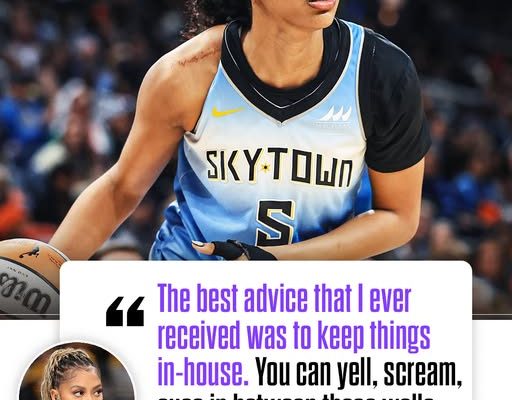Candace Parker has voiced a nuanced view of Angel Reese—neither uncritical nor unreservedly complimentary, but rather one that balances respect for Reese’s accomplishments and potential with standards learned over her own long career. Parker’s comments reflect what she sees as strengths, what she thinks Reese still needs to grow into, and how she positions Reese among her peers. At the core, Parker’s perspective suggests Reese is very good now, but not yet among the league’s elite in her eyes—also that what she’s doing is impressive given her youth, but there’s more ahead if she develops certain skills and consistency.
One of the more talked-about moments came when Parker did a “tier” ranking of WNBA players on Complex Sports. In that ranking, she placed Reese in what she called the “C‑tier”—a lower tier compared to stars like A’ja Wilson, Napheesa Collier, Breanna Stewart (“S‑tier”), Caitlin Clark and others in higher tiers. (SI) Parker’s explanation for putting Reese where she did centered less on disrespect and more on what she believes are the criteria for moving up in those tiers. She said that to be above average, in her view, you have to be—or be able to clearly become—a one‑ or two‑option player for your team. Reese, Parker said, is “fantastic at her role,” especially in offensive rebounding, and has already shown growth between her first and second seasons. But in Parker’s estimation, Reese has not yet proven that she consistently can carry a team or shoulder that level of responsibility in the way the highest‑ranked players have. (SI)
When Parker’s comments drew some criticism—fans and media interpreting the tier ranking as harsh or unfair—she has publicly clarified that she did not intend anything personal or derogatory. She emphasized multiple times that there is “no hate” toward Angel Reese: she respects her, she admires what she has done (especially breaking records, rebounding achievements), and her statements are grounded in analysis rather than emotion or animus. (CBSSports.com) Parker has also said that she is open to debate, to being shown evidence that Reese should be higher; but that criteria matter. (SI)
Beyond the tier ranking, Parker has also made more overtly positive statements—especially regarding Reese’s potential and certain attributes she already exhibits. For instance, during Parker’s jersey retirement ceremony, Parker looked at Reese’s growth and athletic gifts, saying her ceiling seems “endless.” (Newsweek) She praised her physical ability—her conditioning, her ability to run the floor, her rebounding—and noted that she shows signs of being more than just an offensive rebounder, getting more two‑way activity. (SI) Parker also talked about Reese’s first year vs second year growth, how she’s improved in different aspects of the game. (Newsweek)
Another dimension: Parker has been especially attentive to what Reese represents in terms of “role” vs “star burden.” Parker seems to expect that to be considered among the top, Reese will need not only to perform her role (which she already does well) but also to carry enough of the load: implication of being a primary scoring option, consistent decision‑maker, maybe some leadership and ability to be the face of a franchise in comparison to other star players who are in that category already. (SI)
Importantly, Parker has talked about Reese’s admiration for Parker. Angel Reese has publicly expressed how much she has looked up to Candace Parker, how Parker was someone she watched, studied, chose jersey numbers in part inspired by her, etc. Parker appears to reciprocate respect: acknowledging Reese’s work, her talent, and her growth. (Chicago Sun-Times)
In terms of criticisms or areas for improvement from Parker’s perspective: Reese is still young, and Parker often frames her critiques in terms of potential. Reese’s shooting range, ball‑handling, decision making under pressure, leadership, and consistency (especially in taking over games) are among the things Parker seems to think will be necessary next steps for Reese to join the very top tier. In addition, Parker seems to want to see Reese’s influence extend beyond just rebounding and energy to more of the scoring, defensive assignments, perhaps versatility and sustaining high level performances. (Chicago Sun-Times)
Another piece is context: Parker’s tier rankings compare Reese with many players who have been in the league longer, who have established track records, awards, influence, etc. Parker admits that those comparisons should take into account experience, consistency over time, and legacy. Reese is still early in her WNBA journey, and Parker often references that. (SI)
Parker also seems aware of how difficult it can be to evaluate a rising star amid public expectations, media narratives, and comparisons. She has spoken about how often people in women’s sports feel they must over‑explain praise or criticism, or that criticism is sometimes read as personal or negative when it’s meant as constructive. She frames her own commentary as trying to be fair, balanced, honest—having both critique and optimism. (SI)
So, what emerges is that Candace Parker’s relationship, as expressed publicly, with Angel Reese is a complex one: mentor‑admiring, critical yet hopeful, strict in expectations but encouraging of growth. She respects what Reese has done. She sees the things Reese can do now and more importantly what she could become. She doesn’t believe Reese is yet in the “top few players in the league” category—at least under Parker’s personal criteria—but she clearly thinks Reese has a chance to get there if she keeps improving



